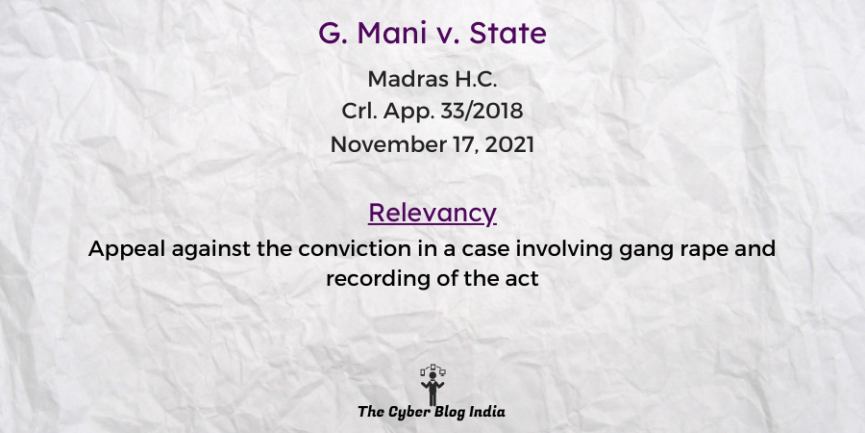G. Mani v. State

G. Mani v. State
In the High Court of Madras
Crl. App. 33/2018
Before Justice P.N. Prakash and Justice R. Hemalatha
Decided on November 17, 2021
Relevancy of the case: Appeal against the conviction in a case involving gang rape and recording of the act
Statutes and Provisions Involved
- The Information Technology Act, 2000 (Section 67A)
- The Indian Penal Code, 1860 (Section 341, 323, 506(ii), 392, 379, 376D, 354)
- The Tamil Nadu Prohibition of Women Harassment Act, 1998 (Section 4)
- The Code of Criminal Procedure, 1973 (Section 374(2))
Relevant Facts of the Case
- The prosecutrix and her friend were on their way to a temple in Royakottai. They stopped in a secluded place, and the prosecutrix went a small distance away to relieve herself. Four men surrounded the prosecutrix and started to strip her.
- On hearing the prosecutrix’s screams, he went there to help her. However, the accused persons overpowered him and tied him to a tree. He also sustained physical injuries.
- Thereafter, the four accused persons gang-raped the victim. One of the accused persons also recorded this incident.
- When a passerby spotted the victims and the accused persons, two accused persons started chasing the passerby. While the rest of them moved the victim to another place and again gang-raped her.
Prominent Arguments by the Advocates
- The petitioner’s counsel argued that there were several discrepancies in the prosecutrix and her friend’s statement regarding the timing of the rape. The counsel also stated that the Test Identification Parade was not done properly. The counsel further stated that the evidence was not authenticated as per Section 65B of the Indian Evidence Act, 1972.
- The respondent’s counsel submitted that all witnesses who have been examined have given corroborative evidence.
Opinion of the Bench
- The recorded video is conclusive evidence that the crime has taken place, and the duration of the crime is not important.
- An injured witness is not expected to give a detailed report to the doctor. If the victim gives contradictory evidence, the defendant could question her under Section 145 of the Indian Evidence Act, 1872. The defendants did not do this.
- With regards to the Test Identification Parade, it is not a rule of law.
- The video supporting the evidence shows there is no doubt as to the involvement of the accused in the crime.
Final Decision
- The bench rejected applications and retained the Sessions Judge’s sentences.
Marc Pereira, an undergraduate student at Rizvi Law College, Mumbai, prepared this case summary during his internship with The Cyber Blog India in January/February 2022.
